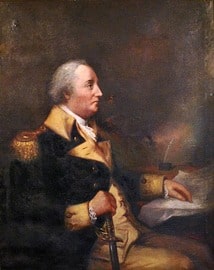William Whipple was born in 1730 at Kittery, Maine. His father was a native of Ipswich and worked as a maltster. His grandfather, Robert Cutts, was a wealthy shipbuilder.
William Whipple: From Cabin Boy to Brigadier General
Firstly, he worked as a cabin boy on a merchant vessel. He often sailed to the West Indies and quickly rose in rank. As his rank increased, so did his wealth. He quit sailing as a commander in 1759. Then he and his brother, Joseph, went into business.
Secondly, the New Hampshire militia appointed Whipple as brigadier general in 1777. The New Hampshire militia served under General Gates. They often clashed with the British General Burgoyne. Finally, they defeated Burgoyne at Saratoga. General Whipple arranged the terms of surrender. Afterward, he marched the British prisoners to Cambridge. During the march to Cambridge, General Whipple talked to his slave.
“Prince, we may be called into action. If so, I trust you will fight bravely for the country.”
Prince replied, “Sir, if I was a free man, I would fight to my blood’s last drop.”
The general replied, “Prince, you are free from this moment.”
Thirdly, Whipple joined Sullivan to take Rhode Island from the British in 1778. As the generals ate breakfast, a British cannonball blew through the house. The cannonball shattered Whipple’s leg. The doctor had to amputate his leg.
William Whipple: Public Servant
Firstly, Whipple attended the Continental Congress in 1776. On July 4, he voted for the Declaration of Independence. In August 1776, he signed the Declaration.
Secondly, elected in 1780, Whipple served in the New Hampshire General Assembly. He also served as a tax collector.
Thirdly, the New Hampshire Assembly appointed Whipple as a Superior Court Judge in 1784. In the fall of 1785, he became ill and went home. On November 28, 1785, William Whipple died of a heart attack at age 55.
Conclusion
William Whipple was an American patriot. Although limited by his early education, he succeeded in life. He was a successful businessman, military leader, and jurist. He was passionate about freedom and representative government.
